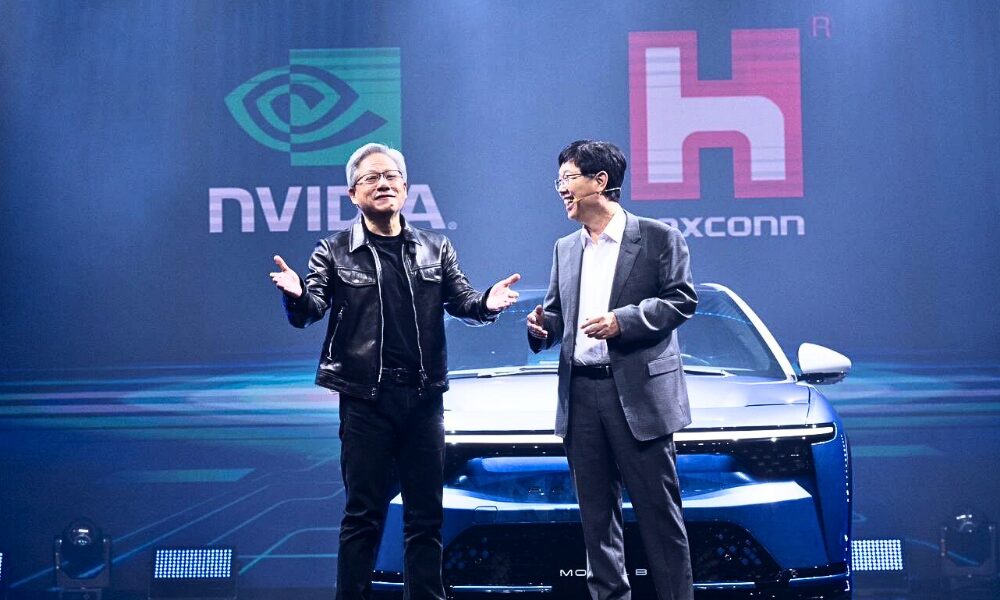|
Getting your Trinity Audio player ready...
|
In a groundbreaking collaboration, Foxconn, the world’s largest contract electronics manufacturer, and Nvidia, the leading chipmaker, have announced their partnership to build advanced “AI factories” focused on the development of self-driving cars and other artificial intelligence (AI) applications. The announcement was made during Foxconn’s annual tech showcase in Taipei, where company leaders outlined their vision for the future of AI-powered manufacturing.
Foxconn Chairman Liu Young-way and Nvidia CEO Jensen Huang took to the stage to unveil their ambitious project, which aims to revolutionize the way self-driving cars learn and adapt. These “AI factories” will serve as hubs for continuous data processing and software improvement, contributing to the development of smarter autonomous vehicles.
Huang illustrated the concept using a hand-drawn sketch, emphasizing that the “AI factories” would play a crucial role in collecting and analyzing data from autonomous electric vehicles. He explained, “This car would go through life experiences and collect more data. The data would be sent to the AI factory, which would enhance the software and update the entire AI fleet.” Huang went on to predict that in the future, “every company and every industry will have AI factories.”
Nvidia recognized as the world’s most valuable chip company, will provide its cutting-edge technology, including the GH200 super chip, for these AI factories. The GH200 super chip, though notable for its capabilities, is restricted from sale in China due to recent export restrictions imposed by the United States. This development follows Nvidia’s decision to halt sales of two less powerful high-end AI chips in the Chinese market, along with one of its top-of-the-line gaming chips.
Nvidia’s shares have surged in 2023, propelling the company to a market value exceeding $1 trillion. Much of this success has been attributed to the increasing utilization of Nvidia’s chips in AI applications across various industries.
For Foxconn, renowned as Apple’s largest iPhone supplier, this partnership with Nvidia represents a strategic move to replicate its assembly success in personal computers and smartphones as it expands into the electric vehicle sector. In January, Foxconn and Nvidia unveiled a collaboration to develop autonomous vehicle platforms, with Foxconn taking the lead in manufacturing electronic control units (ECUs) based on Nvidia’s DRIVE Orin chip, intended for global distribution.
Liu, standing alongside Huang, stated that Foxconn is in the process of transforming itself “from a manufacturing service company to a platform solution company.” This shift aligns with Foxconn’s vision to apply AI factory technology in smart cities and smart manufacturing in addition to self-driving vehicles.
As part of Foxconn’s broader push into the electric vehicle market, the company unveiled the Model N, an electric cargo van, which marks the sixth prototype in its electric vehicle initiative. Although Foxconn has set ambitious goals for EV production, including a target of 5% of the global EV market and $33 billion in revenue from EV and component manufacturing by 2025, its long-term vision is even more ambitious, aiming to manufacture nearly half of the world’s electric vehicles.
Foxconn’s Tech Day coincided with the birthday of its founder, Terry Gou, who is currently running as an independent candidate for Taiwan’s presidency in the upcoming January elections. Notably, Gou was absent from this year’s event, unlike the previous year, when he made a dramatic entrance by driving a prototype electric vehicle onto the stage.
On the stock market, Foxconn shares saw a 0.9% decline on Wednesday, compared to a broader market decrease of 1.2% on the TWII index.
The collaboration between Foxconn and Nvidia represents a significant step towards the widespread integration of AI into various industries, with self-driving cars at the forefront of innovation. This development will be closely monitored by tech enthusiasts and industry stakeholders worldwide as the concept of “AI factories” gains momentum.
